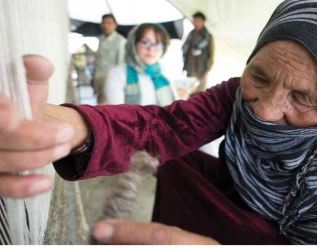International Charity "GoodWeave" provides a thread of hope
11 June 2013
GoodWeave, an international charity established in the mid-Nineties in order to combat the growing issue of child labour, exploitation and trafficking within South Asia’s hand-made carpet and rug industry, recently expanded into Afghanistan. Victoria Noakes (Carpet & Flooring Review) speaks to Samantha Towle, executive director of GoodWeave in the UK, about what is involved with the charity’s work, and what it has helped to achieve so far ...With a presence in Nepal, India, and most recently, Afghanistan, GoodWeave works hard to help eradicate traces of mistreatment of children within the hand-made carpet and rug industry in South Asia. The charity is committed to upholding children’s rights, and offers educational and financial support to ensure that children become literate and can look forward to a brighter future.
Running a labelling programme similar to that used by Fairtrade International, GoodWeave monitors the working conditions within rug-manufacturing companies, and only organisations which pass its inspections are licensed to use the GoodWeave label on their rugs.

By increasing awareness of the widespread existence of child labour in this industry, and introducing an effective certification system for child labour-free carpets and rugs, GoodWeave’s work has already resulted in over eight million certified rugs and carpets being sold in Europe and North America, and the number of children working in the industry is said to have dropped significantly, from 1 million to 250,000.
“During the Industrial Revolution, it was commonplace for British children to be sent to work in the mills as young as eight years old. We wouldn’t find that acceptable today, nor should we think it is acceptable for eight-year-olds in India, Nepal and Afghanistan to sit and weave rugs for up to 14 hours a day with only one meal,” says Samantha.
GoodWeave’s initiative started by identifying that consumer boycotts of rugs would not be effective in solving the problem of child labour, but might, in fact, make the situation worse. Consequently, the charity embarked upon the idea of an industry-led scheme that would provide consumers with an independent guarantee that no child labour had been used in the production of a labelled product.
The first programme was started between India and Germany, and then quickly spread to include Nepal and North America. Today, both the exporter of GoodWeave products from South Asia and the importer in Europe and North America must be licensed by GoodWeave.
“The license fees collected by GoodWeave are used to fund the development programmes we run in our producer countries, and we carry out additional fundraising so that we can expand the scope of our work. The majority of our programmes focus on the provision of education within poor weaving communities,” Samantha explains.
GoodWeave is an innovator in its field. It has developed what is thought to be the only successful model for not only preventing child labour, but also rehabilitating former child workers. Its focus on children’s rights and its system of regular, unannounced inspections has proven effective where many other supply chain audit systems have failed.
Samantha continues: “Self-certification schemes and annual audit visits to the main factory site will never tackle child labour, because the rug industry is full of subcontracting, and children are often found in remote rural villages. This is the message that we are trying to get across to the big retailers who belong to schemes such as SEDEX and ETI – our programme can fulfil their audit requirements and make sure that children are not being exploited.”
Currently, GoodWeave is supported by some big names in high-end design and retail, including The Rug Company, which has a showroom in Harrods, Deidre Dyson and Jacaranda Carpets – but the charity’s quest for more support from carpet and rug industry retailers continues, so as to increase awareness even further.
Over the past couple of years, GoodWeave has developed a new broader standard, which has been introduced this year. This means that the charity will also be tackling crucial issues such as adult – in particular female – working conditions, and environmental protection. GoodWeave’s most recent work in Afghanistan highlights the necessity of these measures.
The hand-made carpet sector is Afghanistan’s largest legal exporting industry, and a vital source of employment. Due to work restrictions, most weaving is home-based, and looms are kept in the female quarters of the home. GoodWeave therefore employs female inspectors, who attempt to gradually build up the trust of the female workers. However, the work can be high-risk in a country where women are often the victims of violence.
“GoodWeave already successfully works in India and Nepal,” says Samantha, “and runs adult literacy for women and girls, removes child labourers from the looms and facilitates their education and financial support, establishes day-care centres, endorses the standardisation of weavers’ wages based on national law and helps weavers with health problems. Similar schemes are planned for Afghanistan but mutual trust needs to be first established.”
“GoodWeave has long recognised that educating and empowering women and girls is essential in the elimination of child labour, exploitation and trafficking. The initial progress made this year by the GoodWeave team in Afghanistan is encouraging – I hope their bravery is rewarded by UK buyers seeking out and purchasing their certified rugs.”
More news from Remland Carpets